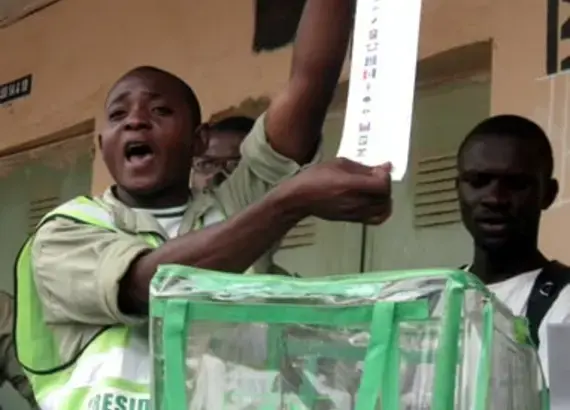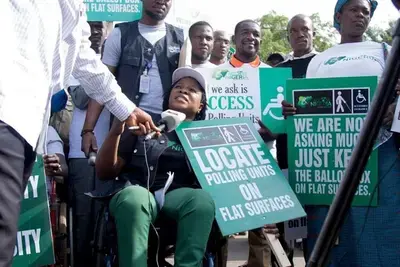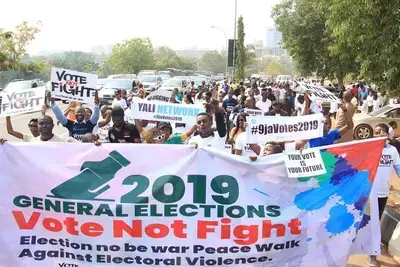
Success Story
Project Swift Count Observes Five Gubernatorial Races in Nigeria
In recent gubernatorial elections in Nigeria, election officials adhered to correct voting procedures and handled ballots according to the law, but the polls were marked by increased voter intimidation and low turnout. These were the findings of Project Swift Count (PSC), a domestic election observation coalition that undertook a parallel vote tabulation (PVT) for five gubernatorial races that took place since December.
As part of a PVT, observers gather data on every stage of an election process, from the opening of polling units to the counting of ballots to the posting of results.
The PSC’s accredited, nonpartisan observers deployed to a representative sample of polling stations and used text messaging to rapidly transmit their observations and the official results announced by election officers to a central information center, where they are compiled. This independent verification of results can lend credibility to the polls.
PSC, which is supported by NDI, also shares its findings and recommendations on the process with the goal of helping improve future elections.
Since Nigeria’s return to civilian rule in 1999, the country had seen a progressive decline in the quality of its elections. However, that changed last year when the presidential and parliamentary elections were seen as some of the most credible that Nigeria has held, despite such challenges as ballot box stuffing, vote buying and voter intimidation. There was also significant violence in the aftermath of the presidential election that led to more than 800 reported deaths, according to the Human Rights Watch.
For the most recent gubernatorial elections -- in Kogi state in December and in Adamawa, Bayelsa, Sokoto and Cross River states in February – PSC successfully mobilized observers to perform PVTs in each location. As a result, PSC independently verified the accuracy of the official results announced by Independent National Election Commission (INEC) in all five states.
INEC Chairman Attahiru Jega said, “Through independent assessment by [Project] Swift Count, we have been able to gain access to some important things about all the elections we have so far conducted.”
Despite many logistical and procedural challenges, PSC observers noted that election officials correctly followed procedures in handling ballots. In more than 95 percent of polling units in all five states, ballots were properly stamped, sorted and counted, which largely prevented fraud at the polling station level. However, PSC noted a downward trend in the timely arrival of election officials and materials. With the exception of the Sokoto poll, 60 percent or less of polling units opened on time, a decline from 76 percent in the presidential elections held in April 2011.
PSC also observed a rise in the number of incidents of intimidation and harassment in two of the states. While such incidents were seen at only 6 percent of polling units during presidential voting, PSC observers saw them in 16 percent of stations in Adamawa and 14 percent in Sokoto. The other states had rates of harassment on par with the April poll.
PSC cited the low voter turnout in all of the gubernatorial elections, except Bayelsa state, which had a 71.4 percent turnout rate. That unusually high turnout could be attributable to numerous factors, including inaccuracies in the voter roll or multiple voting, PSC said. Bayelsa, which had a 91 percent turnout in the presidential election, is the home state of President Goodluck Jonathan, which could account for increased voter interest. While turnout for the other states in the presidential election was roughly 54 percent, turnout for gubernatorial elections dropped to near or below one-third of registered voters.
In its press statement after the Sokoto election, PSC said “more efforts should be made by INEC and civil society organizations to educate voters on the importance of participating in the electoral process.”
PSC is a Nigerian coalition launched to help ensure free, fair and peaceful elections and to enhance transparency and accountability in the electoral process. With technical assistance from NDI, PSC successfully conducted Nigeria’s first-ever PVTs during the April presidential poll, establishing a nationwide system to collect and analyze information from more than 30,000 observers at a representative sample of polling units in every local government area in the country. Given the estimated 170 million people living in Nigeria and the sheer size of the electorate, PSC’s ability to successfully use the PVT method is considered a major achievement for the Nigerian electoral process.
Read More:
Published March 30, 2012



